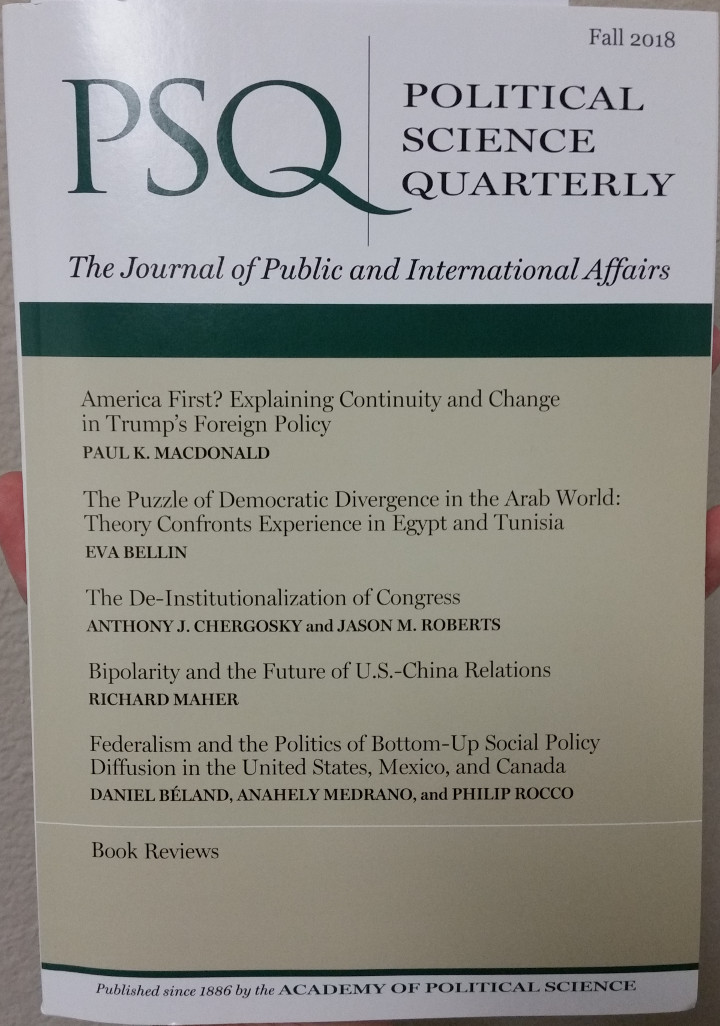
Noted recall: The goal is to describe, in just a few words, what the article is about. Additionally, if I think the article is particularly note-worthy (good or bad), I will comment on that. Compare this to a small sticky note, something to jog your memory about the contents of an article. Of course, if I miss the point of an article, or fail to find anything remarkable, that is entirely the fault of the reviewer.
Available at: https://www.psqonline.org/volume.cfm?IDIssue=546

America First? Explaining Continuity and Change in Trump's Foreign Policy - Paul K. MacDonald
(read 2018-10-13)
Look at foreign policy under Trump. How much has it diverged from Obama vs stayed the same. Overview of influences on foreign policy, either towards change or status quo: (experience of) staff, congress, other government input (military, federal reserve), interest groups, input from allies, public feedback. Looks at 19 of the (paraphrased) "most impactful" foriegn policy decisions in Trump's first year and compares to 1) campaign promises and then 2) existing/continuing Obama policy or diverging; reasons policy went the way it did. Some criticisms and potential long term damage from Trump's foreign policy.
The Puzzle of Democratic Divergence in the Arab World: Theory Confronts Experience in Egypt and Tunisia - Eva Bellin
(read 2018-10-15)
Look at Egypt and Tunisia in the early 2010's, transition to democracy; Egypt's transition back to authoritarianism. Factors which cause a country to transition into and out of democracy. It seems the biggest differences were in the military -- very active in Egypt as oppressors; defended civilians in Tunisia while being more or less neutral (further reading: general Rachid Ammar of Tunisia) -- civil society organizations, and the character of leadership: trusted in Tunisia, with a background promoting democracy. Also mentions (democratic) labor union, very large and politically active in Tunisia, which influenced the transition explicitly, but also by promoting trust in a democratic institution.
The De-Institutionalization of Congress - Anthony J. Chergosky and Jason M. Roberts
(read 2018-10-16)
Discusses US congress, how it might be (historically) characterized as an institution: rules, ranks, regulations. Importance was placed on seniority (usually), and committee staff had focused knowledge. Then looks at various ways to measure congressional success and shows decline for the past 20 or 30 years. Proposes one factor is de-institutionalization of congress: that choice of committee chair has violated seniority a number of times, committees are bypassed when convenient, rise in % allocation of congressional staff to state/home offices, decline in number of committee staff, and decline in experienced/specialized staffers. (Mentions related books: Mann & Ornstein; Mayhew.)
Bipolarity and the Future of U.S.-China Relations - Richard Maher
(read 2018-10-20)
Article about transition from "unipolar moment" with US as leading world power, to a bipolar world between US and China. Some history and stats on how China's global presence has grown. Comparisons between Cold War and Russia, differences to China. Generally less hostility now compared to then. Discusses causes for NATO existence (opposite Russia), it seems a new US alliance in Asia (opposite China) would have more tenuous agreements (would be less stable/powerful). Strong economic interdependence between US and China (at least currently). (Short summary here, but the article goes into a lot of depth about each of the above).
Federalism and the Politics of Bottom-Up Social Policy Diffusion in the United States, Mexico, and Canada - Daniel Bëland, Anahely Medrano, Philip Rocco
(read 2018-10-20)
Looks at how policy at the city and state level might effect policy change at the national level. Case studies of Romneycare and Obamacare, a pension plan in Mexico City later adopted at the national level, and childcare in Quebec which was not adopted at the national level. I'll be honest, I found this article extremely boring.